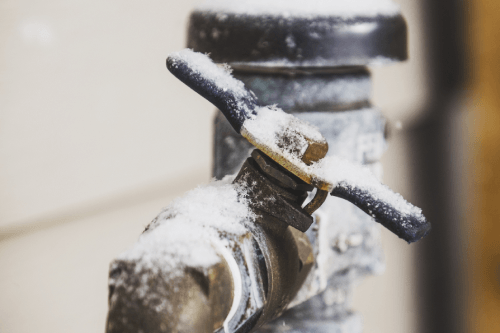Crucial Tips for Avoiding Frozen Pipes in Winter Seasons
Crucial Tips for Avoiding Frozen Pipes in Winter Seasons
Blog Article
We have uncovered this post on Helpful Tips to Prevent Frozen Pipes this Winter listed below on the net and figured it made sense to share it with you on my blog.

Winter can ruin your pipes, especially by freezing pipes. Right here's how to stop it from occurring and what to do if it does.
Intro
As temperature levels drop, the risk of icy pipelines rises, possibly causing pricey repair work and water damages. Comprehending exactly how to avoid frozen pipes is important for house owners in chilly climates.
Avoidance Tips
Shielding at risk pipelines
Cover pipes in insulation sleeves or use warmth tape to shield them from freezing temperatures. Focus on pipes in unheated or outside areas of the home.
Heating strategies
Maintain interior rooms appropriately warmed, specifically locations with pipes. Open closet doors to allow warm air to flow around pipes under sinks.
Exactly how to recognize frozen pipelines
Seek decreased water flow from faucets, uncommon odors or noises from pipes, and visible frost on subjected pipes.
Long-Term Solutions
Architectural changes
Consider rerouting pipes away from exterior walls or unheated locations. Include extra insulation to attics, basements, and crawl spaces.
Updating insulation
Buy high-quality insulation for pipes, attic rooms, and wall surfaces. Appropriate insulation helps maintain constant temperatures and decreases the threat of frozen pipelines.
Safeguarding Outdoor Plumbing
Garden pipes and outside faucets
Detach and drain yard pipes before wintertime. Mount frost-proof faucets or cover outside faucets with insulated caps.
Understanding Icy Pipelines
What causes pipelines to freeze?
Pipelines freeze when subjected to temperature levels below 32 ° F (0 ° C) for extended periods. As water inside the pipes freezes, it increases, putting pressure on the pipeline walls and possibly causing them to rupture.
Threats and damages
Frozen pipelines can result in water disruptions, residential property damages, and costly fixings. Ruptured pipelines can flood homes and cause extensive structural damages.
Indications of Frozen Pipeline
Identifying icy pipelines early can prevent them from bursting.
What to Do If Your Pipelines Freeze
Immediate actions to take
If you suspect icy pipes, maintain faucets open to relieve stress as the ice melts. Utilize a hairdryer or towels soaked in warm water to thaw pipes gradually.
Conclusion
Protecting against frozen pipelines calls for proactive actions and quick actions. By recognizing the causes, indications, and safety nets, homeowners can secure their plumbing during winter.
6 Proven Ways to Prevent Frozen Pipes and Protect Your Home
Disconnect and Drain Garden Hoses
Before winter arrives, start by disconnecting your garden hoses and draining any remaining water. Close the shut-off valves that supply outdoor hose bibs and leave the outdoor faucet open to allow any residual water to drain. For extra protection, consider using faucet covers throughout the colder months. It’s also important to drain water from any sprinkler supply lines following the manufacturer’s directions.
Insulate Exposed Pipes
Insulating your pipes is an effective way to prevent freezing. Pipe insulation is readily available at home improvement stores and is relatively inexpensive. Pay close attention to pipes in unheated areas such as the attic, basement, crawl spaces, or garage. Apply foam insulation generously to create a buffer against the cold. You can also wrap your pipes in heat tape or thermostat-controlled heat cables for added warmth.
Seal Air Leaks
Inspect your home for any cracks or openings that could let in cold air. Seal any holes around the piping in interior or exterior walls, as well as the sill plates where your home rests on its foundation. Additionally, make sure to keep your garage door closed unless you’re entering or exiting. Leaving it open creates a significant air leak that can lead to frozen pipes.
Allow Warm Air Circulation
During cold snaps, it’s essential to allow warm air to circulate evenly throughout your home. Leave interior doors ajar to promote better airflow. Open kitchen and bathroom cabinets to help distribute heat consistently around the rooms. If you have small children or pets, be sure to remove any household chemicals or potentially harmful cleaners from open cabinets for safety.
Let Faucets Drip
A small trickle of water can make a big difference in preventing ice formation inside your pipes. When temperatures drop significantly, start a drip of water from all faucets served by exposed pipes. This continuous flow helps prevent the water from freezing. Additionally, running a few faucets slightly can relieve pressure inside the pipes, reducing the chances of a rupture if the water inside does freeze.
https://choateshvac.com/6-proven-ways-to-prevent-frozen-pipes-and-protect-your-home/

I found that entry on How to prepare your home plumbing for winter weather while doing a lookup on the internet. Sharing is nice. You just don't know, you may just be helping someone out. Thanks for being here. Come back soon.
Request An Estimate Report this page